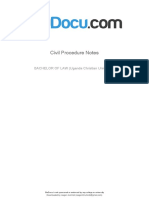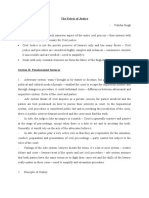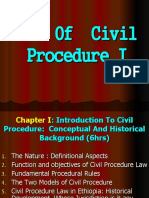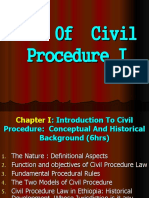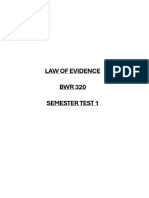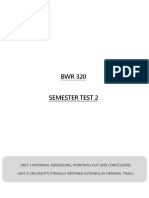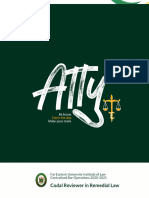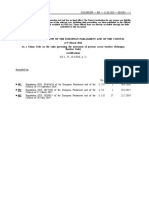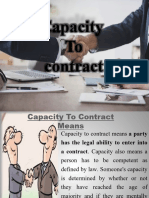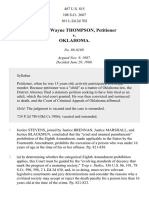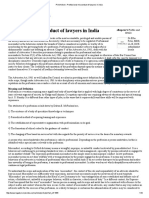Pass & Prosper
Civil Procedure
SIP 412
Produced by Pass & Prosper
With reference to the prescribed textbook and other resources where relevant
1
Disclaimer: These notes are provided by Pass and Prosper for free and are drafted by Pass and
Prosper tutors for their own studying benefit. These notes are not sold for profit and therefore,
there may occasionally be minor mistakes. In such an event, please contact the tutor to effect
the correction. Note we are in no way affiliated or a branch of the UP Law Faculty as we are an
independent service.
� Pass & Prosper
Chapter 1 – Introduction (This will not be tested but is good for understanding so just read)
What is Civil Overview
Procedure? ❖ General
➢ Remember the difference between substantive law and procedural
law.
➢ Substantive law = Rights and Duties of People.
➢ Procedural law = Enforcing those rights.
Civil vs Overview
Criminal ❖ Criminal Procedure
Procedure ➢ Exists to regulate the enforcement of rights and duties with respect
to criminal law.
➢ The parties are usually the State and the member of the public which
the State is seeking to punish.
➢ The power relationship is unequal, so the criminal procedure law
exists to regulate and equalise that relationship.
❖ Civil Procedure
➢ The parties to civil matters are private and usually of a more equal
power.
➢ The objective of civil procedure is to enable a private party to
approach a court for legal relief, on the basis of the infringement of
their right, so that the appropriate remedy may be enforced.
Do Not Confuse Terminology
❖ Criminal Matters
➢ The Prosecutor
➢ The Accused
❖ Civil Matters (Action Proceedings)
➢ The Plaintiff
➢ The Defendant
❖ Civil Matters (Application Proceedings)
➢ The Applicant
➢ The Respondent
Key Difference between Civil and Criminal Proceedings
❖ Main Points
➢ Civil = Voluntary. Party can pull their matter/settle at any time.
➢ Criminal = The victim has no control over the matter once it starts.
The State is in charge once they lodge a complaint.
Principles Relevant Principles Listed
underlying the ❖ All persons must have equal and effective access to an independent
law of civil and impartial judiciary, including the requirement that the costs and
procedure and duration of litigation be reasonable.
access to ❖ Throughout the proceedings the parties must be afforded an equal
justice opportunity to present their respective cases to the court. This
requirement is referred to as the audi alteram partem principle, and
ensure that (NB):
➢ The defendant is notified of the proceedings; and
2
Disclaimer: These notes are provided by Pass and Prosper for free and are drafted by Pass and
Prosper tutors for their own studying benefit. These notes are not sold for profit and therefore,
there may occasionally be minor mistakes. In such an event, please contact the tutor to effect
the correction. Note we are in no way affiliated or a branch of the UP Law Faculty as we are an
independent service.
� Pass & Prosper
➢ Both parties are informed of the nature of the opposing party’s
case, as well as the grounds on which it is based; and
➢ Both parties are afforded the opportunity to present their
respective cases to the court.
❖ The decision to institute or defend an action and to determine the scope
of the dispute rests with the parties, and the parties decide on the
evidentiary material to be presented as proof of their respective cases,
which is referred to as party control.
❖ During the presentation of the parties’ respective cases provision must
be made for direct oral communication between the parties
(personally or by means of their legal representatives) and the court.
This does not exclude the possibility that important elements of the
presentation, such as some types of evidentiary material, may be in
writing.
❖ The main proceedings (trial or the hearing of an application) must, in
principle, take place in public.
❖ The court must consider the evidentiary material on objective and
rational grounds.
❖ The court must give a reasoned and legally motivated judgment and
furnish it expeditiously.
❖ The decision of the court is final and binding, but provision exists for
appeal or review. A recission of judgement s also possible in certain
specific circumstances.
Sources of the Overview (NB ones are Marked Accordingly)
Law of Civil ❖ The Constitution of the Republic of South Africa
Procedure ❖ The Constitutional Court Complementary Act and the Rules of the
Constitutional Court
❖ The Superior Courts Act (NB)
❖ The Rules of the Supreme Court of Appeal
❖ The Uniform Rules of Court applicable in the High Court (NB)
❖ The Magistrates’ Courts Act (NB)
❖ The Magistrates’ Courts Rules (NB)
❖ The Small Claims Court Act
❖ The common law underlying the rules of procedure and jurisdiction in
the High Court
❖ Other legislation and regulations relevant to specialised courts.
❖ Practice arrangements and directives applicable in the respective
divisions of the High Court.
❖ Case Law
Mechanisms Overview
for Solving ❖ Civil Court Structures
Civil Disputes ❖ Alternative Dispute Resolution (ADR) by application of Civil Procedure
Mediation vs Arbitration
❖ Mediation
➢ Mediator is merely a guide to help parties reach an agreement.
3
Disclaimer: These notes are provided by Pass and Prosper for free and are drafted by Pass and
Prosper tutors for their own studying benefit. These notes are not sold for profit and therefore,
there may occasionally be minor mistakes. In such an event, please contact the tutor to effect
the correction. Note we are in no way affiliated or a branch of the UP Law Faculty as we are an
independent service.
� Pass & Prosper
❖ Arbitration
➢ Decision of the Arbitrator is final, and the arbitral award is
enforceable as if it were a court order.
Electronic Overview
Court System ❖ It exists to make the action and application process more efficient.
❖ Known as “e-filing” and a “digital case-management system.”
4
Disclaimer: These notes are provided by Pass and Prosper for free and are drafted by Pass and
Prosper tutors for their own studying benefit. These notes are not sold for profit and therefore,
there may occasionally be minor mistakes. In such an event, please contact the tutor to effect
the correction. Note we are in no way affiliated or a branch of the UP Law Faculty as we are an
independent service.
� Pass & Prosper
Chapter 2 – Structure and Officers of the Courts
Introduction Overview
❖ General
➢ According to section 165 of the Constitution, the judicial authority of
the Republic of South Africa vests in the courts, which are
independent and subject only the Constitution and the law, which
must be applied impartially and without favour or prejudice.
❖ Some Key Terms
➢ Locus Standi → A party bringing a matter to court or defending
themselves must have a “direct and substantial” interest in the right
which forms the subject matter of the litigation. This is a common
law principle which has been widened by section 38 of the
Constitution.
➢ Litigation Involving Organs of State → Before the Constitutional
dispensation, there were much stricter notice requirements.
However, the “Institution of Legal Proceedings against Certain
Organs of State Act” has aligned these notice requirements and
prescriptive periods with the Constitution.
➢ HCR 17(4) → Prior to its amendment, this rule required every
summons to state the names of parties and the defendant’s sex as
well as marital status (if a woman). The Nedcor Band Ltd case ruled
this to be discriminatory and unequal on the basis of sex.
➢ Section 65 of the Magistrates’ Courts Act → This involves the debt
collection procedure. The courts have held that the former
procedure which allowed a civil debtor to be placed in prison for
failure to pay, was unconstitutional. New procedures now exist
allowing for extended payment plans, instalments and attachment
of immoveable and moveable property.
Hierarchy of Overview
South African ❖ Order of Authority
courts and ➢ Constitutional Court (CC)
Stare Decisis ➢ Supreme Court of Appeal (SCA)
➢ High Court (HC or the acronym for the relevant division)
➢ Magistrates’ Courts
➢ Any other court.
❖ Stare Decisis
➢ The decisions of higher courts bind lower courts.
The Constitutional Court
❖ Section 167(3) provides:
➢ (a) It is the highest court in all matters.
➢ (b) It may adjudicate on constitutional matters, as well as any other
matter, if the Constitutional Court grants leave to appeal on the
grounds that such other matter raises an arguable point of law of
general public important that ought to be considered by the court.
5
Disclaimer: These notes are provided by Pass and Prosper for free and are drafted by Pass and
Prosper tutors for their own studying benefit. These notes are not sold for profit and therefore,
there may occasionally be minor mistakes. In such an event, please contact the tutor to effect
the correction. Note we are in no way affiliated or a branch of the UP Law Faculty as we are an
independent service.
� Pass & Prosper
➢ (c) Is the final decision-maker on whether a matter is within its
jurisdiction.
The Supreme Court of Appeal
❖ Section 13 of the Superior Courts Act
➢ The “NOT FINISHED EN KLAAR” Rule
➢ In terms of this section, the quorum for both criminal and civil
appeals in the Supreme Court of Appeal is generally five judges.
➢ The majority decision is passed by the court.
➢ If at any time during hearing of an appeal, one or more judges dies,
retires or otherwise becomes incompetent to preside or is absent,
the trial proceeds before the remaining judges, and the majority
judgement of those judges constitutes the judgement of the court.
➢ When the majority cannot come to an agreement, the matter is
adjourned and commenced de novo (from the start) before a new
court composed and determined by the President of the Court.
The High Court Divisions
❖ Gauteng Division
➢ Gauteng Division, Pretoria (GP)
➢ Gauteng Division, Local Seat Johannesburg (GJ)
❖ KwaZulu-Natal Division
➢ KwaZulu-Natal Division, Pietermaritzburg (KZP)
➢ KwaZulu-Natal Division, Durban (KZD)
❖ Free State Division
➢ Free State Division, Bloemfontein (FB)
❖ Western Cape Division
➢ Western Cape Division, Cape Town (WCC)
Magistrates’ Courts
❖ General
➢ All Magistrates’ Courts are creatures of statute and are created by
and operate within the four corners of the Magistrates’ Courts Act.
➢ It is divided into two levels:
▪ District Courts
▪ Regional Courts
➢ Before 2010 there was only 1 Magistrates’ Court with many divisions.
❖ Developments
➢ The Regional Magistrates’ Court previously exercised only criminal
jurisdiction.
➢ However, now it may also deal with civil matters including divorce
(but only the Regional Court).
❖ Jurisdiction
➢ Civil Matters
▪ District Court = R0 – R200K
▪ Regional Court = R200’001.00 – R400K
6
Disclaimer: These notes are provided by Pass and Prosper for free and are drafted by Pass and
Prosper tutors for their own studying benefit. These notes are not sold for profit and therefore,
there may occasionally be minor mistakes. In such an event, please contact the tutor to effect
the correction. Note we are in no way affiliated or a branch of the UP Law Faculty as we are an
independent service.
� Pass & Prosper
Specialised Labour Courts
Courts ❖ Creation
➢ Section 151 of the Labour Relations Act establishes a Labour Court
having the same authority, powers and standing as a High court in
relation to matters under its jurisdiction.
❖ Seat
➢ There are four labour courts.
❖ Functions
➢ It has jurisdiction in all the provinces of South African and may
perform its duties at any place within the Republic, having exclusive
jurisdiction out of matters arising out of the LRA and other relevant
matters arising out of the BCEA, UIA, SDA, EEA, OHSA and the
COIDA.
➢ Section 167 of the LRA also establishes a Labour Appeal Court as the
final court of appeal in respect of all judgments and orders made by
the Labour Court regarding matters within its exclusive jurisdiction.
Its status in this respect is the same as the Supreme Court of Appeal.
➢ It has concurrent jurisdiction with the civil courts to hear and
determine any matter concerning a contract of employment.
The Land Court
❖ Creation
➢ It was established in terms of section 3 of the Land Court Act in 2023.
❖ Seat
➢ Johannesburg but it may convene at any other place if the Judge
President considers it expedient or in the interests of justice.
❖ Functions
➢ Having the same status as the High Court, it has exclusive
jurisdiction to determine, inter alia:
▪ Right to restitution of any land in accordance with the
Restitution of Land Rights Act.
▪ Issues of compensation in respect of the appropriation or
acquisition of such land.
▪ Title to such land.
▪ Whether compensation received at the time of dispossession of
land was just and equitable.
▪ Matters involving the interpretation or application of the Land
Reform (Labour Tenants) Act, and the Extension of Security of
Tenure Act.
➢ Appeals go to the SCA or CC where appropriate.
The Special Income Tax Court
❖ Creation
➢ Sections 116 – 132 of the Tax Administration Act provides for the
constitution of a special court for the hearing of income tax appeals
by persons dissatisfied with decision made by the commissioner of
the South African Revenue Service.
7
Disclaimer: These notes are provided by Pass and Prosper for free and are drafted by Pass and
Prosper tutors for their own studying benefit. These notes are not sold for profit and therefore,
there may occasionally be minor mistakes. In such an event, please contact the tutor to effect
the correction. Note we are in no way affiliated or a branch of the UP Law Faculty as we are an
independent service.
� Pass & Prosper
❖ Composition
➢ Judge or Acting Judge of High Court.
➢ An Accountant (of no less than 10 years standing)
➢ A representative of the commercial business community.
❖ Proceedings
➢ Proceedings are commenced by a notice of appeal served on the
commissioner within the time period specified in section 83(7) of the
Act.
The Competition Appeal Court
❖ Creation
➢ The Competition Act establishes the Competition Commission.
➢ It also establishes a Competition Tribunal, which is responsible for
adjudicating such matters.
➢ Section 36 further establishes a Competition Appeal Court.
❖ Functions
➢ Responsible for:
▪ Investigation
▪ Control
▪ Evaluation
➢ … of restrictive practices, abuses of dominant positions and
mergers.
➢ No appeals from Competition Appeal Court to the Supreme Court of
Appeal.
❖ Composition
➢ At least 3 judges of the High Court (Competition Appeal Court).
The Electoral Court
❖ Creation
➢ Section 18 of the Electoral Commission Act establishes the
Electoral Court for the Republic of South Africa, with the same status
as the High Court.
❖ Composition
➢ A Judge from the SCA
➢ 2 Judges from the High Court
➢ 2 Other members who are South African Citizens
❖ Functions
➢ May review any decision of the Electoral Commission relating to an
electoral matter, and it may hear certain appeals against decisions
of the Electoral Commission.
The Consumer Court and Related Matters
❖ Creation
➢ The former Consumer Affairs (Unfair Business Practices) Act
provided for the prohibition or control of certain business practices
considered harmful to the public interest.
8
Disclaimer: These notes are provided by Pass and Prosper for free and are drafted by Pass and
Prosper tutors for their own studying benefit. These notes are not sold for profit and therefore,
there may occasionally be minor mistakes. In such an event, please contact the tutor to effect
the correction. Note we are in no way affiliated or a branch of the UP Law Faculty as we are an
independent service.
� Pass & Prosper
➢ The Consumer Protection Act sets out a regulatory and enforcement
framework for the protection of fundamental consumer rights which
exist between a consumer and a supplier.
❖ Functions
➢ A consumer may enforce any consumer right set out in a transaction
or agreement or resolve any dispute with a supplier by referring the
matter to the necessary ombud, the National Consumer Tribunal,
National Consumer Commission, an alternative dispute resolution
agent, the Consumer Court or approach any civil court with the
necessary jurisdiction when all other remedies have been
exhausted.
The Divorce Court
❖ Creation
➢ The 1929 Colonial government established a Divorce Court
exclusively for Black persons by way of an amendment to section 10
of the Native Administration Act of 1927.
➢ It was removed by the enactment of the Divorce Courts Amendment
Act of 1997.
❖ Jurisdiction
➢ The former Divorce Court had concurrent jurisdiction with the High
Court in respect of divorce and ancillary matters.
➢ It has now been absorbed into the Magistrates’ Courts of a Regional
Division which are currently party of the ordinary structure of
Magistrates’ Courts.
The Children’s Court
❖ Creation
➢ The former Children’s Act first established a specialised Children’s
Court to deal with child welfare issues.
➢ It was replaced by the Child Care Act in 1983, which also provided
for a Children’s Court.
➢ The 1983 Child Care Act was then replaced by the modern Children’s
Act.
❖ Jurisdiction
➢ In terms of section 42 of the current Children’s Act, every
Magistrates’ Court is deemed to be a Children’s Court and has
jurisdiction over matters arising from the application of the Act.
➢ Magistrates are thus empowered to preside over these matters in
terms of the same section.
The Maintenance Court
❖ Creation
➢ The Maintenance Act first established the court in 1963.
❖ Jurisdiction
➢ Under the 1963 Act, every Magistrates’ Court is within its area of
jurisdiction, also a Maintenance Court for the purposes of the Act.
9
Disclaimer: These notes are provided by Pass and Prosper for free and are drafted by Pass and
Prosper tutors for their own studying benefit. These notes are not sold for profit and therefore,
there may occasionally be minor mistakes. In such an event, please contact the tutor to effect
the correction. Note we are in no way affiliated or a branch of the UP Law Faculty as we are an
independent service.
� Pass & Prosper
➢ The present Maintenance Act retains this special court at District
Court level and provides procedures designed to assist applicants
to obtain and enforce maintenance orders.
The Equality Court
❖ Creation
➢ Section 16 of the Promotion of Equality and Prevention of Unfair
Discrimination Act provides that every Magistrates’ Court and every
High Court is also an Equality Court.
❖ Functions
➢ The Equality Court is a specialised court established to deal with
complaints of unfair discrimination.
❖ Composition
➢ A judge or magistrate must be designated as an Equality Court
presiding officer before he or she may sit in such a court, but this can
occur only after he or she has received special training.
➢ The Act also provides for the designation of clerks of the Equality
Court.
Officers of the Judges
Court ❖ General
➢ Preside in the Constitutional Court, Supreme Court of Appeal and
High Court.
➢ Judges are Appointed by the President on advice from the Judicial
Services Commission.
❖ Rules
➢ Section 14 of the Judicial Serve Commission Act provides for a
Judicial Conduct Committee to receive and deal with complaints
against judges and makes provision for a Code of Judicial Conduct.
Magistrates
❖ General
➢ Judicial officers who serve in the Magistrates’ Court are district court
magistrates and regional court magistrates.
➢ Traditionally they were exclusively appointed from Prosecutors but
more recently more private practitioners are also being appointed.
Registrars of the High Court
❖ General
➢ Chief of the administrative court staff in a division or a local seat of a
division of the High Court.
Clerks and Registrars of Magistrates’ Courts
❖ General
➢ Court administrators in the district Magistrates’ Courts are called
clerks of the court.
10
Disclaimer: These notes are provided by Pass and Prosper for free and are drafted by Pass and
Prosper tutors for their own studying benefit. These notes are not sold for profit and therefore,
there may occasionally be minor mistakes. In such an event, please contact the tutor to effect
the correction. Note we are in no way affiliated or a branch of the UP Law Faculty as we are an
independent service.
� Pass & Prosper
The Sheriff
❖ General
➢ The sheriff is an officer of the court attending to the service of all
court processes such as summonses and subpoenas and plays an
important role in the execution of court orders.
The Master of the High Court
❖ General
➢ A master is appointed in each division of the High court.
➢ The office performs functions relating to deceased and insolvent
estates, the liquidation and judicial management of companies and
the interests of persons who are incompetent to administer their
own affairs.
Legal Practitioners
❖ General
➢ Attorneys → General practitioners attending to a wide rang of legal
functions apart from representing parties in civil or criminal
proceedings.
➢ Advocates → Specialists in court proceedings and the drafting of
legal opinions.
The Legal Overview
Practice Act ❖ Generally
➢ The core objective of the Legal Practice Act is to ‘provide a legislative
framework for the transformation and restructuring of the legal
profession which is broadly representative of the Republic’s
demographics under a single regulatory body.’
➢ The Act establishes a single governing South African Legal Practice
Council which replaces both the Law Society of South African and
the General Bar Council, but both bodies may still operate privately
with voluntary membership and no statutory obligations.
❖ The Purpose of the Act
➢ (a) Provide a legislative framework for the transformation and
restructuring the legal profession according to the values
underpinning the Constitution and to ensure that the rule of law is
upheld.
➢ (b) Broaden access to justice by putting in place:
▪ (i) A mechanism to determine fees chargeable by legal
practitioners for legal services rendered that are within the reach
of the citizenry.
▪ (ii) Measures to provide for the rendering of community service
by practicing legal practitioners.
▪ (iii) Measures that provide equal opportunities for all aspirant
legal practitioners in order to have a legal profession that broadly
reflects the demographics of South Africa.
➢ (c) Create a single statutory body to regulate the affairs of all legal
and candidate legal practitioners.
11
Disclaimer: These notes are provided by Pass and Prosper for free and are drafted by Pass and
Prosper tutors for their own studying benefit. These notes are not sold for profit and therefore,
there may occasionally be minor mistakes. In such an event, please contact the tutor to effect
the correction. Note we are in no way affiliated or a branch of the UP Law Faculty as we are an
independent service.














